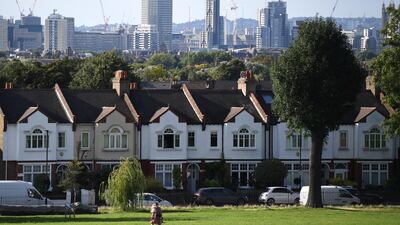British house prices dipped in March when buyers were bracing for the expiration of a temporary tax break on purchases, mortgage lender Nationwide said.
Average prices fell 0.2 per cent from February to £232,134, slowing the pace of the annual increase to 5.7 per cent from 6.9 per cent in February.
Robert Gardner, Nationwide's chief economist, said the slowdown in March followed a 0.7 per cent rise in prices in February when the market was still caught up in a mini boom.
"Given that the wider economy and the labour market performed better than expected in recent months, the slowdown in March probably reflects a softening of demand ahead of the original end of the stamp duty holiday before the chancellor announced the extension in the budget," Mr Gardner said.
Britain’s housing market soared last year following Chancellor Rishi Sunak’s stamp duty land tax holiday, unveiled in July. The tax break, which removes the levy from the first £500,000 of the purchase price of a main residence in England and Northern Ireland, caused a surge in transactions.
UK mortgage approvals dipped in February when buyers expected Mr Sunak's property tax break to expire, although levels remained the highest since March 2016, Bank of England data showed this week.
UK lenders approved 87,700 home loans in February, down by almost 10,000 on January and significantly lower than the peak of 103,700 in November. However, approval levels were still 30 per cent higher than the same month a year ago.
Mr Sunak extended the tax break in his March budget to keep the market buoyant in the months ahead as the country slowly eases its Covid-19 restriction measures.
The SDLT holiday is set to continue until the end of September, though from June onwards the threshold for the nil rate band will decrease.
Looking at the first quarter of 2021 in the UK, Northern Ireland saw the highest level of annual house price growth with a 7.4 per cent increase compared to the same period a year ago, while Wales and Scotland recorded growth of 7.2 per cent and 6.9 per cent respectively.
England was the weakest performing nation in the three months to the end of March with a 6.4 per cent increase compared to last year, a slight slowdown on the fourth quarter of 2020.
Mr Gardner said recent signs of economic resilience, along with the stimulus measures announced in the budget, such as the extension of the furlough scheme, stamp duty holiday and mortgage guarantee scheme, suggested that housing market activity is likely to remain buoyant over the next six months.
“It may be that the recovery continues to gather momentum and that shifts in housing demand resulting from the pandemic continue to lift the market,” he said.
“However, if the labour market weakens towards the end of the year as policy support is withdrawn, as most analysts expect, then activity is likely to slow nearer the end of 2021, perhaps sharply.”


